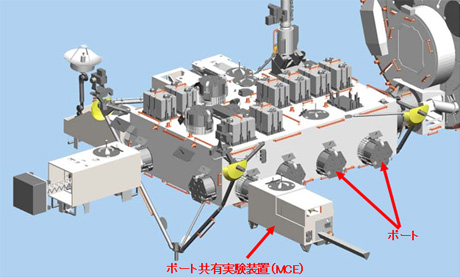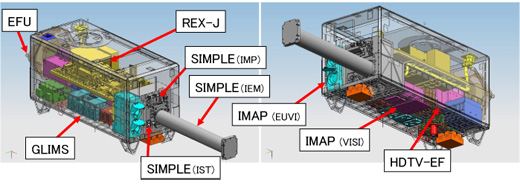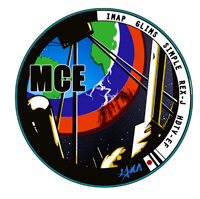This is an archive of information released in the past.
Disclaimer: It may contain broken links or outdated information. Some parts may not function in current web browsers.
*Visit https://humans-in-space.jaxa.jp/en/ for the latest information.

Experiment
- News
- Kibo Utilization Strategy
- Kibo Utilization Plan
- List of JAXA's Utilization Themes
- Experiment Facilities
- Space Environment Utilization
- Archive
Multi-mission Consolidated Equipment (MCE)
JAXA has developed a Multi-mission Consolidated Equipment (MCE), as a series of the Exposed Facility (EF) experiments for the Kibo Second Phase Utilization.
Kibo's EF has several ports called the Exposed Facility Units (EFU) which connect payloads with the EF. MCE is a conglomeration of five small mission payloads that perform experiment or observation to facilitate an effective use of the port.

EF with MCE installed.
So far, four experiment-payloads have been installed to EF, Space Environment Data Acquisition equipment (SEDA-AP), Monitor of All-sky X-ray Image (MAXI), Superconducting Submillimeter-Wave Limb-Emission Sounder (SMILES), and NASA's HICO and RAIDS Experiment Payload (HREP).
Each payload has one mission, SEDA-AP measures space environment; MAXI monitors all-sky x-ray, and SMILES observes ozone depleting substance, while MCE is a consolidated payload consists of independent five missions. This enables us to perform various missions using just one port.
MCE was launched on July 21, 2012, aboard the H-II Transfer Vehicle KOUNOTORI3 (HTV3 mission) and installed to the EP on August 9, 2012. Onboard five mission payloads listed below are all selected missions thorough deliberation and evaluation by the ISS/JEM Utilization Advisory Committee and JEM-FE sub-committee.

MCE schema
(1) Ionosphere, Mesosphere, upper Atomosphere, and Plasmasphere mapping (IMAP)
| Theme proposer | Graduate schools of Kyoto University |
| Principle Investigator (PI) | Akinori Saito |
| Mission summary | IMAP clarifies the physical mechanism of disturbances that occur near the rim of atmosphere by observing airglow and resonant scattering using visible and near-infrared spectral imager and extreme ultraviolet imager at the Earth's upper atmosphere (with an altitude of 80 km or greater.) |
| News | IMAP mission obtained its first observation data (January 28, 2013) |
| Other information | ISS-IMAP website |
(2) Global Lightning and Sprite Measurement Mission (GLIMS)
| Theme proposer | Graduate schools of Osaka University |
| PI | Tomoo Ushio |
| Mission summary | Using CMOS camera, photometer, VHF interferometer, and VLF receiver, GLIMS observes lightning and sprites to identify global distribution and their variation of Transient Luminous Events (TLE) and lightning. GLIMS also observes horizontal structure of sprites to identify the differences of the corresponding lighting development time and spatial distribution. GLIMS investigates electronic energy of TLE, time difference between lightning/sprite and gamma-ray flashes and the lightning process. (Sprite: Large-scale electrical discharges that occur at an altitude of 40 to 90 km accompanied by positive cloud-to-ground discharges.) |
| News | JEM-GLIMS obtained its first observation data (January 31, 2013) |
| Other information | GLIMS mission website by one of the participants, Hokkaido University |
(3) Space Inflatable Membranes Pioneering Long-term Experiments (SIMPLE)
| Theme proposer | Graduate schools of the University of Tokyo |
| PI | Takahira Aoki |
| Mission summary | SIMPLE collects fundamental engineering data on orbit by exposing the inflatable structure (an ultralight structure which can be inflated by a rise in the internal pressure with gas) in the space environment for a long term. |
| News | Successful extension of Inflatable Extension Mast (IEM) and deployment of Inflatable Space Terrarium (IST) (September 5, 2012) |
(4) Robot Experiment on JEM (REXJ)
| Theme proposer | JAXA |
| PI | Mitsushige Oda |
| Mission summary | Validate robot's spatial migration and working function inevitable for robots to support astronauts' extravehicular activity (EVA) using a robot with extended arm and tether. |
| News | Operational checkout was performed for the Robot Experiment on JEM (REX-J) (October 31, 2012) REX-J experiment results (YouTube, Japanese audio) |
(5) Assessment of Commercial-off-the-shelf, high definition television camera under exposed environment (COTS HDTV-EF)
| Theme proposer | JAXA |
| PI | Mitsushige Oda |
| Mission summary | The mission uses the commercial-off-the-shelf camcorder to assess if it survives under the exposed environment, recording its just beneath Earth surface (covering 200km x 350km) from an altitude of 400 km. |
| News | COTS HDTV-EF successfully obtained Earth surface video image (October 30, 2012) |
| Item | Specification | |
|---|---|---|
| Width | 0.8m | |
| Height | 1.0m | |
| Length | 1.8m (excluding SIMPLE extension) | |
| Mass | 450 kg | |
| Mission Payload | 1. Ionosphere, Mesosphere, upper Atomosphere, and Plasmasphere mapping (IMAP) 2. Global Lightning and Sprite Measurement Mission (GLIMS) 3. Space Inflatable Membranes Pioneering Long-term Experiments (SIMPLE) 4. Robot Experiment on JEM (REXJ) 5. Assessment of Commercial-off-the-shelf, high definition television camera under exposed environment (COTS HDTV-EF) |
|
| Copyright 2007 Japan Aerospace Exploration Agency | Site Policy |

